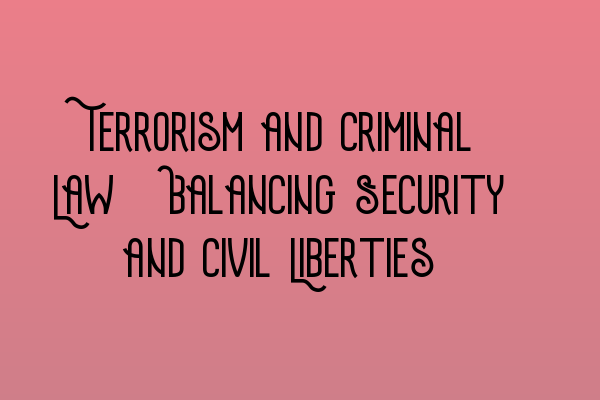Terrorism and Criminal Law: Balancing Security and Civil Liberties
As criminal law practitioners, it is our duty to navigate the complex and delicate balance between maintaining national security and upholding the civil liberties of individuals. Terrorism, defined as the use of violence or intimidation for political, religious, or ideological purposes, poses significant challenges to societies around the world. In this blog post, we will explore the intersection of terrorism and criminal law, and the ongoing efforts to strike the right balance.
The Rise of Terrorism
Terrorism has been a persistent threat in recent decades, with numerous high-profile attacks shaking our sense of security. From the devastating events of 9/11 to more recent attacks in major cities, the impact of terrorism on individuals, communities, and nations is undeniable. The rise of terrorism has necessitated the development of robust legal frameworks to combat these threats.
Legislation and Counter-Terrorism Measures
Governments worldwide have enacted legislation specifically tailored to address the unique challenges posed by terrorism. These laws provide law enforcement agencies with increased powers to prevent, investigate, and prosecute acts of terrorism. Key counter-terrorism measures include:
- SQE 1 Preparation Courses: An overview of the SQE 1 exam and how to prepare.
- SQE 2 Preparation Courses: Preparing for the SQE 2 exam and the relevant course options.
- SRA SQE Exam Dates: Important dates and deadlines for the SRA SQE exams.
These measures empower law enforcement agencies to gather intelligence, conduct surveillance, and detain suspected terrorists. However, the increased state powers have not come without controversy.
The Impact on Civil Liberties
As the fight against terrorism intensifies, concerns over potential infringements on civil liberties have emerged. Critics argue that the expansive powers granted to law enforcement agencies compromise privacy, freedom of speech, and the presumption of innocence. Balancing the need for security with the protection of civil liberties is an ongoing challenge.
Procedural Safeguards and Judicial Oversight
To mitigate the potential abuse of counter-terrorism measures, robust procedural safeguards and judicial oversight have been implemented. These mechanisms ensure that the powers granted to law enforcement agencies are exercised within the bounds of the law.
Safeguards may include:
- Warrants and judicial authorization for surveillance and searches.
- Strict evidentiary standards for prosecution and conviction.
- Periodic review of counter-terrorism legislation.
- Judicial oversight of intelligence agencies.
These safeguards help maintain the balance between security and civil liberties, ensuring that terrorism-related investigations and prosecutions are conducted fairly and within the confines of the law.
The Role of Criminal Law Practitioners
As criminal law practitioners, we play a crucial role in ensuring that the rights of individuals, including those accused of terrorism-related offenses, are protected. Our expertise in criminal procedure, evidence, and human rights law allows us to navigate the complexities of terrorism cases and advocate for fair outcomes.
By staying abreast of the evolving legal landscape and participating in ongoing professional development, we can provide effective representation for our clients while upholding the principles of justice and the rule of law.
Conclusion
Terrorism poses significant challenges to societies around the world, requiring a delicate balance between security concerns and the preservation of civil liberties. As criminal law practitioners, we have a vital role in upholding the rights of individuals while ensuring that those who seek to commit acts of terror are held accountable. By understanding the intersection of terrorism and criminal law, we can continue to navigate this complex landscape and contribute to the pursuit of justice.
Related Articles:
